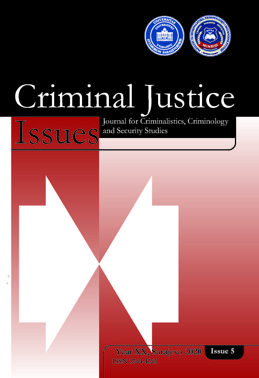Deterrence Through Criminal Confiscation? Some Exploratory Findings from Federation of Bosnia and Herzegovina
Deterrence Through Criminal Confiscation? Some Exploratory Findings from Federation of Bosnia and Herzegovina
Author(s): Darko Datzer, Eldan MujanovićSubject(s): Criminal Law
Published by: Fakultet za kriminalistiku, kriminologiju i sigurnosne studije Univerziteta u Sarajevu
Keywords: illegal gain; criminal confiscation; deterrence;
Summary/Abstract: Reason(s) for writing and research problem(s): Large bulk of crime has pecuniary motives. From the criminal justice perspective, logical consequence would be to remove the profit out of crime, which would make crime pointless and reduce or remove the motivation of would-be wrongdoers to commit crime. Prior empirical research, especially in Bosnia and Herzegovina, did not sufficiently address deterrence through criminal confiscation. Aims of the paper (scientific and/or social): This paper has sought to explore deterrent effect of criminal confiscation by examining prerequisites for deterrence using aggregate data from Federation of Bosnia and Herzegovina. Methodology/Design: The study is exploratory and aims to provide not a definitive, thorough and comprehensive picture of confiscation landscape in Federation of Bosnia and Herzegovina, but to sketch an overall state of affairs. Data from 284 final court rulings were obtained covering years 2003-2016. Research/paper limitations: Since the clear data on number of judicial cases containing con-fiscation order is largely unknown, the study relies completely on one source of data and is uncertain on representativeness. Furthermore, aggregate level of data in studying deterrence properties (certainty, severity and celerity) are often contested and abundant with missing values, which was indeed the case with this study. Results/Findings: Findings suggest that confiscation amounts in Federation of Bosnia and Herzegovina are rather low, do not remotely match the values actually gained through crime and are far below European average for confiscation cases. It is also found that confiscation is rarely used relative to total number of typical acquisitive crimes reported each year and when used, it is in lengthy procedures for predominantly low value cases for high volume crimes such as theft, robbery and drug offences. General conclusion:With non-existent prerequisites for effective deterrence, confiscation cannot reasonably be expected to have significant impact on general levels of offending. Research/paper validity:Measures of certainty, severity and celerity were developed for this study. Similar research methods and measures were utilized in previous research on deterrence. Utilized methods and measures seem reasonable to examine concepts above, ensuring appropriate level of face validity.
Journal: Kriminalističke teme – Časopis za kriminalistiku, kriminologiju i sigurnosne studije
- Issue Year: XX/2020
- Issue No: 5
- Page Range: 1-30
- Page Count: 30
- Language: English

